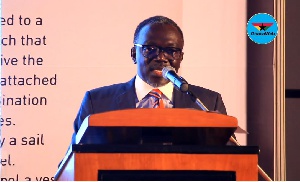So far, Ghana and the rest of Africa seem to have escaped the cataclysmic consequences of the elusive and cunning Coronavirus.
While calculated, bold decisions and quick interventions from the President have certainly helped our beloved Ghana to minimise the severity of this unprecedented global crisis on our nation, certain natural factors, behaviours and products may have also contributed to reducing the impact.
Indeed, the role of the sun, and its natural vitamin D, humidity and natural nutriments including, Ayoyo leaves, Cassava roots, Shea nut leaves, Cocoa seeds, Neem (nim) tree, Cocoa leaves, Cocoa roots, Cassava leaves, Prekese, Shea nuts, Roselle leaf(for sobolo), Tiger nuts(atadwe), Neem leaves etc may also have helped to alleviate the spread and severity of the virus for some local communities.
However, a relative lack of R&D funding in Ghana has meant that no substantive evidence-based direct studies examining their health and risk suppositions have been conducted by our esteemed scientists. Equally, recent assertions relating to the potential of the Coronavirus potentially being transmitted through wigs and hair pieces and possibly via facial sweat also remain scientifically uncorroborated due to lack of funding.
The big question that comes to mind is whether venerable Ghanaian scientists should be seriously funded to enable them prove or disprove these assertions.
The African Centre for Disease Control is currently so underfunded that its thought leaders have been reduced to simply commenting on matters of strategic importance as opposed to leading the charge to solve some of the regions pressing disease control issues. The same applies to Ghana’s CSIR and other research institutions.
To date, Ghanaians, in most cases, have had to sadly wait for American and European scientists to undertake these types of research in their own time and usually only when surplus funding is available.
Once the research is complete we are then informed of the benefits or hazards associated with certain products on our well-being.
This means that it is usually American and European research institutes that gain the rights to own the data, patents and rights to commercialise them. This is especially the case when it comes to nutraceuticals and phtyoceuticals.
Not only has the SAR-COV-2 and COVID-19 clearly exposed the weakness of the global public health systems, it has equally also revealed the dire lack of R&D funding that bedevils our continent and hampers our ability to be self-sufficient in the areas of health care, pharmaceuticals, cosmeceuticals, agroceuticals, food production, etc.
In 2017 according to the office of the national statistics, UK research and development (R&D) expenditure totalled 34.8 billion GBP or 1.69% of GDP. Others significant R&D funders as per UNESCO Institute for Statistics and Statistica include: Israel- 4.0%(2018), Sweden 3.1%(2014), Germany 2.9% (2016) USA-2.79%(2016), China-2.19%(2018), Japan-3.18%(2016), and South Korea-4.29%(2014),
Although Africa accounted for 0.9% of global R&D spending in 2019, the majority of this funding was external funding from tied donations.
Between 2010 and 2014 the Scientists magazine revealed that the US National Institutes of Health (NIH) provided $300 million in grants to researchers in 17 of 54 African countries, with around $200 million going to South Africa alone.
Another question that comes to mind is whether Ghana, and the rest of the continent, should continue to depend on other countries and continents to fund our research and subsequently spend their money developing products to suite our needs?
President Akufo Addo has recognised this need and, as part of his laudable Beyond Aid Agenda, has set the scene for significant increases in funding for research and development to help realise his goal of Ghana becoming a major hub for pharmaceutical and vaccine manufacturing. Let us hope that he gets the much needed support to commit at least 1% percent of Ghana GDP to R&D funding from his current and subsequent governments.
Based on the 2019 GDP of Ghana, as reported by Trading Economics, this equates to at least 660m USD annually over the next 10 years. This may seem like a significant amount of money to risk, but policy makers must bear in mind that if even one of these products can be commercialised it could easily generate at least 1.5 times that figure over a defined period.
Short-term thinking is the enemy of long-term success. Investment in R&D is geared towards coming up with potential solutions to future needs and requirements. Therefore, patience is needed and investments that do not reap immediate results should not be seen as a waste.
With long term thinking, the Chinese has managed to create a tea market which according to Statisitca had a market revenue of $17.9B USD in 2017. Majority of these tea plantations(especially green tea) and processing factories are in China creating millions of jobs for its citizens.
South Africa is also making very good and similar progress with amongst others the Rooibos tea. With sustained funding for R&D, Ghana can also benefit from some of these naturally occurring dietetic products in the country.
The potential for Ghana, to immensely benefit from the commercialisation of some of the country’s’ naturally occurring raw materials in the form of cosmeceutical, phytoceuticals, pharmaceuticals, agroceutcals and nutraceuticals is huge.
At present Africa’s share of global Intellectual Property (IP) registration stands at less than 1%. Yet, a very significant amount of the materials used in commercialising these patents come from Africa.
The success of the USDGs and the Beyond Aid Agenda are dependent on the funding available to R&D.
Hopefully the Coronavirus pandemic has given the regions’ leaders, decision makers and policy makers a wakeup call to annually commit to spend at least 1% of their respective GDPs on R&D to enable our revered scientists and engineers to undertake continental relevant research.
Until then the entire continent will continue to be at the mercy of western nations who already have their own citizenry needs to attend to before considering the needs of Africans.
Opinions of Friday, 19 June 2020
Columnist: thebusiness24online.net



















